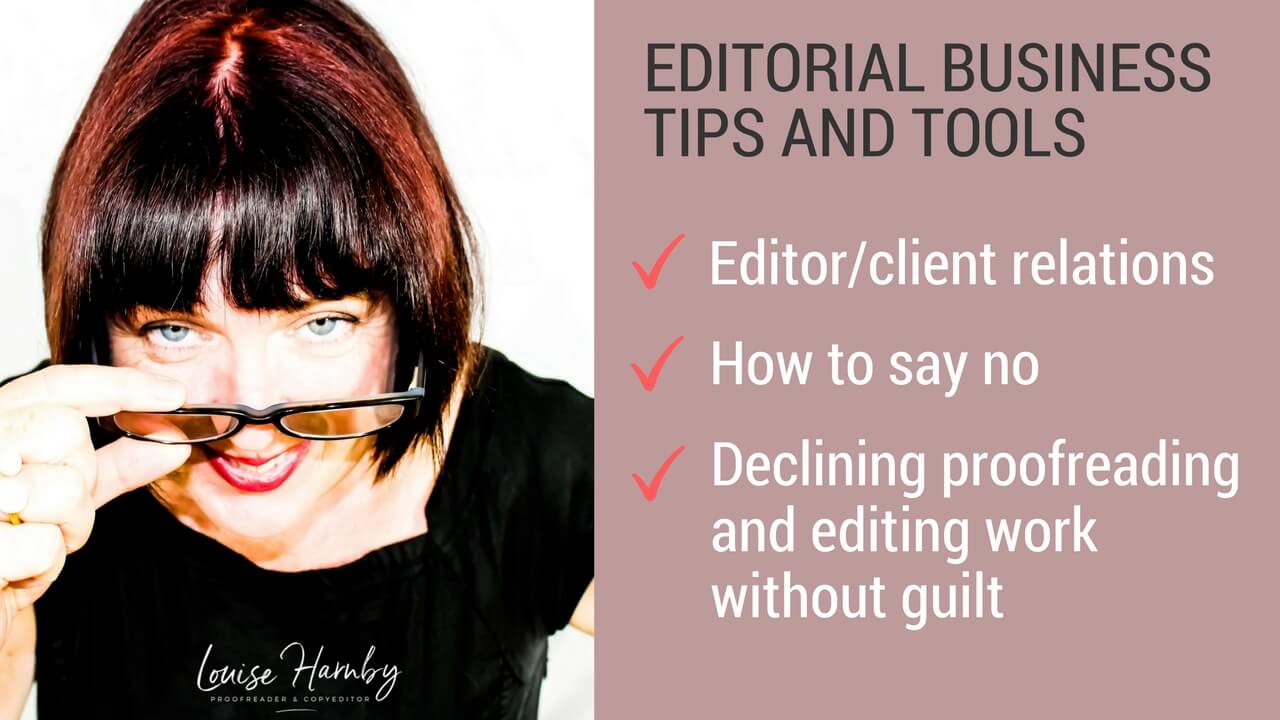|
Exercising the right to accept or decline work is, in my opinion, one of the best things about owning one’s own business. And yet some editorial professionals feel guilty about saying no. What's to be done?
Some of us have experienced a situation where we have to withdraw from an ongoing project because of what one of my colleagues calls “scope creep”.
Here, the originally agreed terms of the work have been breached by the client, rendering continuation of the project non-viable unless new terms can be negotiated that are acceptable to both parties. This demonstrates why it’s important to clarify the parameters of any editorial project before an agreement is made to carry out the work. How to pull out of existing project work is beyond the scope of this article. Here I’m focusing on saying no to the offer of editorial work prior to commencement of the project, and how guilt should not be part of the editorial business-owner’s decision to so. In Part I, I look at the reasons for accepting or declining work, how some editorial freelancers talk about feeling guilty, and how those statements stack up against the reality of what’s going on. In Part II, I’ll consider some simple ways of saying no that make it clear that the project is being declined, why this decision is being made, and what the client can do to find an alternative supplier. I’ll also explore the dangers of using an over-pricing strategy to deter an unwanted client, and consider how the guilt-ridden editorial pro might place her feelings within an adapted 10/10/10 framework in order to move forward with a decision that’s in her business's best interests.
Reasons to accept and reasons to decline
I might decline a proofreading project for one, or several, of the following reasons:
I might accept a proofreading project for one, or several, of the following reasons:
See also Liz Broomfield’s (2013) discussion of what kinds of work you might say no to at various stages of your business’s development.
It’s my business and my choice
Whether I accept or decline, the choice is mine. I’m not bound to carry out proofreading work that, for whatever reason, I don’t wish to. There’s no boss telling me that our company is contractually bound to do A or B, or that I must work for X, even though I find dealing with X stressful, intimidating, infuriating, or upsetting. I choose the hours I need/wish to work. I choose the type of editorial work I carry out (in my case, proofreading). I choose the material I feel comfortable with. I decide whether a fee is acceptable based on my needs and wants. Ultimately, I can decline a project for no other reason than I simply don’t fancy doing it. End of story.
Feeling guilty
Despite having control over the choices they can make, it’s not uncommon to hear editorial freelancers say they feel guilty about not accepting a job:
In all of the above, the story is of the problems being faced by the client if the editorial pro turns down the work. However, we as business owners need to flip things around and look at the situation from our own point of view.
The reality ...
Now let's look at the above 4 scenarios from the perspective of the editorial business owner:
No isn't negative ...
Psychologist Judith Sills (2013) argues that “No – a metal grate that slams shut the window between one's self and the influence of others – is rarely celebrated. It's a hidden power because it is both easily misunderstood and difficult to engage” and “it is easily confused with negativity”. So, when we decline work, we need think of the decision not in terms of negative impact on our clients, but rather in terms of the positive impact on our editorial businesses. In Part 2, we’ll look at ways to communicate an uncomplicated “no” message, and consider an adapted version of Suzy Welch’s 10/10/10 framework that should help the guilt-ridden editorial pro to say no with greater confidence.
Louise Harnby is a line editor, copyeditor and proofreader who specializes in working with crime, mystery, suspense and thriller writers.
She is an Advanced Professional Member of the Chartered Institute of Editing and Proofreading (CIEP), a member of ACES, a Partner Member of The Alliance of Independent Authors (ALLi), and co-hosts The Editing Podcast. Visit her business website at Louise Harnby | Fiction Editor & Proofreader, say hello on Twitter at @LouiseHarnby, connect via Facebook and LinkedIn, and check out her books and courses.
4 Comments
28/10/2014 02:27:11 am
Excellent advice, Louise! Looking forward to Part II.
Reply
30/10/2014 02:28:50 am
Excellent post, thank you. Just what I needed for encouragement.
Reply
Louise Harnby
21/2/2018 11:59:06 am
Glad you liked it, T Marie. It's something we all have to face at one time or another!
Reply
Leave a Reply. |
BLOG ALERTSIf you'd like me to email you when a new blog post is available, sign up for blog alerts!
TESTIMONIALSDare Rogers'Louise uses her expertise to hone a story until it's razor sharp, while still allowing the author’s voice to remain dominant.'Jeff Carson'I wholeheartedly recommend her services ... Just don’t hire her when I need her.'J B Turner'Sincere thanks for a beautiful and elegant piece of work. First class.'Ayshe Gemedzhy'What makes her stand out and shine is her ability to immerse herself in your story.'Salt Publishing'A million thanks – your mark-up is perfect, as always.'CATEGORIES
All
ARCHIVES
July 2024
|
|
|
|

















 RSS Feed
RSS Feed





